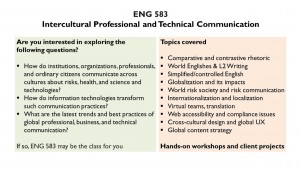My teaching focuses on intercultural professional and technical communication, grant writing, scientific writing, workplace communication, and medical rhetoric. I have been experimenting with directed reading and research classes related to artificial intelligence, technical communication, entrepreneurship, and social justice in the last few years.
ENG 583. Intercultural Professional and Technical Communication
Offered as a special topic seminar, ENG 583 explores the way professional and technical communicators cope with challenges posed by the need to work with global clients and colleagues in their daily work settings. It deals with issues related to communication across countries, cultures, languages, legal systems, professions, abilities, and design conventions. Topics covered include comparative and contrastive rhetoric, World Englishes & L2 Writing, simplified/controlled English, globalization and its impacts, world risk society and risk communication, internationalization and localization, virtual teams, translation, web accessibility and compliance issues, cross-cultural design and global UX, and global content strategy. It features hands-on workshops and client projects.
ENG 626: Advanced Writing for Empirical Research
ENG 626 is a seminar and workshop for graduate students in empirical research fields who are working on conference proposals, grant proposals, theses and dissertations, journal articles, or other significant research texts. The course provides intensive practice and feedback on writing, grounded in an introduction to rhetorical principles and analysis.
ENG 522: Writing in Nonacademic Settings
ENG 522 has two components: an academic component and an experiential component. For the academic component, students will read articles relevant to writing in nonacademic settings from selected journals and anthologies, work on resumes, LinkedIn profiles, and professional e-portfolios, and deliver workshops related to their specialized areas and lead class discussions. For this semester, we also worked on content strategy projects by conducting content audit, content gap analysis, and competitor analysis of various clients’ websites before delivering research-informed recommendations. For the experiential component (practicum), students will work approximately eight hours per week (at least 120 hours total) within an organization relevant to their interests and areas of expertise.
ENG 512. Theory and Research in Professional Writing
English 512 helps students to understand professional and technical communication as a discipline. It focuses on how the field produces knowledge through various types of research and how it utilizes specialized discourses and practices. In a way, this course is an introduction to what it means to be a part of a community of practitioners of technical communication, what resources are available for professional communicators, and how we can navigate through these resources to invent solutions to challenges we encounter in the workplace on a daily basis. Topics covered in this course include history of technical communication, rhetorical theory and ethics, qualitative and quantitative methods, visual communication, risk communication, information design, project management, single sourcing, among others. Students worked on case studies of technical communicators and original research or annotated bibliographies on topics of interest to them as future technical communicators.

